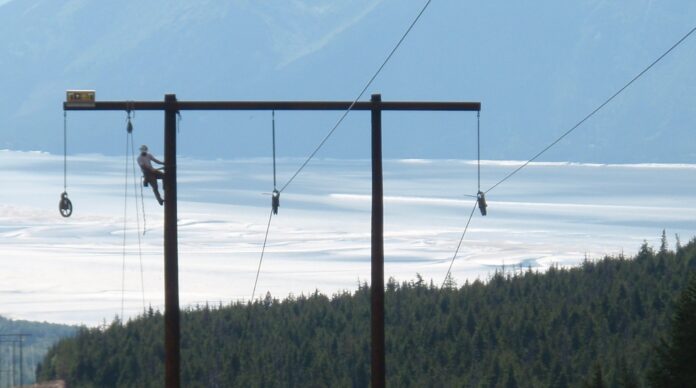The Alaska Center, formerly the Alaska Center for the Environment, has officially secured majority control of the Chugach Electric Association Board of Directors following the 2025 election, which ended May 30. The control by the leftists of Alaska’s largest utility will influence how it governs for years to come and may eventually lead to power insecurity in the Railbelt.
With the election of Katherine Jernstrom to a four-year term, five of the board’s seven directors were endorsed by The Alaska Center.
That gives the group a solid 71.4% majority, with serious implications for future energy policy, ratepayer impacts, and the political influence of the board.
The current board now includes:
- Mark Wiggin, Chair – Alaska Center-endorsed
- Sisi Cooper, Vice Chair
- Rachel Morse, Treasurer – Alaska Center-endorsed
- Susanne Fleek-Green, Secretary – Alaska Center-endorsed
- Jim Nordlund, Director – Alaska Center-endorsed
- Dan Rogers, Director
- Katherine Jernstrom, Director – Alaska Center-endorsed
Only Dan Rogers and Sisi Cooper are independent of pressure from The Alaska Center. The rest owe their seats to a powerful leftist coalition that includes the Renewable Energy Alaska Project (REAP) and wealthy labor unions such as IBEW 1547 and the AFL-CIO.
These coordinated endorsements on Alaska’s largest utility’s board consistently deliver 6,500 votes in elections that typically see about 10,000 to 11,000 votes cast.
For example, when Bettina Chastain, an independent candidate in 2023, Susanne Fleek-Green got 6,700 votes, Jim Nordlund received 6,400, and Chastain came in with 6,200, beating The Alaska Center’s Shaina Kilcoyne’s 6,000 votes. In 2024, when Alaska Center’s Mark Wiggan ran, he received 6,400 votes, and this year Katherine Jernstrom pulled out 6,500 votes.
The membership of Chugach Electric Association is not quite 90,000. The participating voters, just 11–12% of eligible cooperative members, determine the outcome. For a regular candidate running independently, breaking through is nearly impossible without matching the Democrat-identifying coalition in both funding and visibility. The high turnout for board seat elections came in 2023, when 15% voted. This year’s election season at Chugach Electric Association was more subdued.
In 2024, Dan Rogers pulled off a rare upset by unseating then-chair Sam Cason. But Rogers was uniquely positioned. He is well-known in the electric utility sector, a former Chugach Electric employee, and was able to finance a significant campaign. Chastain, once a longtime board chair, also managed to win in 2023 by spending her own money and benefiting from name recognition. But even she barely edged out an Alaska Center-backed challenger.
Now, with Jernstrom’s win, the door has effectively closed on independents. The Alaska Center is the new gatekeeper.
In utility association elections, there are no campaign finance disclosures, spending limits, or election transparency laws that govern the races. That lack of oversight has allowed advocacy groups to dominate what are supposed to be member-owned cooperatives, and it’s beginning to show.
Readers of Must Read Alaska will recall that The Alaska Center gets funding through the shadowy Arabella Advisors network of donors, with funding coming through subsets that include the Sixteen Thirty Fund and the Tides Foundation, League of Conservation Voters, another 501(c)(4) environmental advocacy group that gets funding from Arabella Advisor groups.
The board’s Alaska Center-aligned majority is expected to push hard for environmental policy priorities, including the controversial removal of the Eklutna River dam, a push that is concerning to ratepayers and those concerned about long-term energy reliability in Southcentral Alaska.

Meanwhile, the looming natural gas shortage, which is expected to become acute after 2028, demands urgent strategic planning. However, the majority of the board of Alaska’s largest electric utility are firmly anti-fossil fuel and deeply committed to renewables, even as some experts warn that large-scale wind and solar projects for the region are neither economically viable nor technically feasible as replacements.
By resisting cheaper natural gas options in favor of renewables, the board may be steering the utility toward higher rates, less reliability, and costly infrastructure changes that burden ratepayers.
Compounding concerns about the environmentalist takeover of Chugach Electric, board member Susanne Fleek-Green recently took a job as Chief of Staff to Anchorage Mayor Suzanne LaFrance. That’s raised eyebrows in the wake of a new Anchorage Assembly ordinance that permitted Assemblywoman Anna Brawley to also serve as partisan legislative staffers to Democrat Rep. Andrew Gray, who represents Anchorage in the Legislature. Fleek-Green being both on the board of the utility and running the city of Anchorage raises questions about political loyalty vs. sound energy policy.
Katherine Jernstrom’s successful 2025 campaign shows just what has happened to Chugach Electric. She was backed by a long and influential list of endorsers, as published on her campaign website. These endorsers include Democrat Mark Begich, who was the person who negotiated the deal to sell Municipal Light and Power (the Anchorage utility) to Chugach Electric and for whom Fleek-Green was a paid congressional staff member when Mark Begich was in the Senate:
- The Alaska Center
- IBEW 1547
- Alaska AFL-CIO
- Renewable Energy Alaska Project (REAP)
- Alaska Carpenters Union
- Rep. Andrew Gray
- Sen. Forrest Dunbar
- Rep. Zack Fields
- Rep. Carolyn Hall
- Rep. Ky Holland
- Assemblyman Daniel Volland
- Former Anchorage Mayor and U.S. Senator Mark Begich
- Former Rep. Jennie Armstrong
- Former Rep. Jonathan Kreiss-Tomkins
- Jimmy Miner
- Matt McDaniel
- Ben Kellie
- Jon Bittner
- Karen King
- Lori Davey
- John-Henry Heckendorn
- Katie Scovic
- Eric McCallum
- Andre Horton
- Kate Consenstein
- Radhika Krishna
- Kirk Rose
- Laile Fairbairn
- Claire Pywell
- Gretchen Fauske
- Jenna Wright
- Brit and Jerrod Galanin
- Veronica Slajer
- Isaac Vanderburg
- Penny Gage
- David McCarthy
- Bill Popp
As the power dynamic on the Chugach Electric board shifts sharply toward a Green New Deal ideological direction, ratepayers may soon feel the impact in the form of higher bills, costly and unreliable experimentation projects, and fewer checks and balances at the utility’s top level. The governance of Alaska’s utility cooperative is no longer representing the members, but is now representing the Democratic Party and its surrogate — The Alaska Center (for the Environment).
